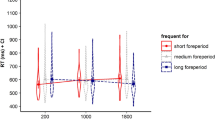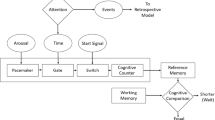Abstract
Previous evidence suggests that alcohol affects various forms of temporal cognition. However, there are presently no studies investigating whether and how alcohol affects on time-based event expectations. Here, we investigated the effects of alcohol on time-based event expectations. Seventeen healthy volunteers, aged between 19 and 36 years, participated. We employed a variable foreperiod paradigm with temporally predictable events, mimicking a computer game. Error rate and reaction time were analyzed in placebo (0 g/kg), low dose (0.2 g/kg) and high dose (0.6 g/kg) conditions. We found that alcohol intake did not eliminate, but substantially reduced, the formation of time-based expectancy. This effect was stronger for high doses, than for low doses, of alcohol. As a result of our studies, we have evidence that alcohol intake impairs time-based event expectations. The mechanism by which the level of alcohol impairs time-based event expectations needs to be clarified by future research.


Similar content being viewed by others
References
Abroms BD, Fillmore MT (2004) Alcohol-induced impairment of inhibitory mechanisms involved in visual search. Exp Clin Psychopharmacol 12:243–250
Abroms BD, Gottlob LR, Fillmore MT (2006) Alcohol effects on inhibitory control of attention: distinguishing between intentional and automatic mechanisms. Psychopharmacology 188:324–334
Babor TF, Higgins-Biddle JC, Saunders JB, Monteiro MG (2001) The alcohol use disorders identification test: guideline for use in primary care, 2nd edn. World Health Organization, Geneva
Brumback T, Cao D, King A (2007) Effects of alcohol on psychomotor performance and perceived impairment in heavy binge social drinkers. Drug Alcohol Depend 91:10–17
Bush LK, Hess U, Wolford G (1993) Transformations for within-subject designs: a Monte Carlo investigation. Psychol Bull 113:566–579
Coull JT, Morgan H, Cambridge VC, Moore JW, Giorlando F, Adapa R, Corlett PR, Fletcher PC (2011) Ketamine perturbs perception of the flow of time in healthy volunteers. Psychopharmacology 218:543–556
Creelman CD (1962) Human discrimination of auditory duration. J Acoust Soc Am 34:582–593
do Canto-Pereira M, de PA David I, Machado-Pinheiro W, Ranvaud RD (2007) Effects of acute alcohol intoxication on visuospatial attention. Hum Exp Toxicol 26:311–319
Dry MJ, Burns NR, Nettelbeck T, Farquharson AL, White JM (2012) Dose-related effects of alcohol on cognitive functioning. PLoS One 7(11):e50977
Gibbon J (1977) Scalar expectancy theory and Weber’s law in animal timing. Psychol Rev 84:279–325
Guillot CR, Fanning JR, Bullock JS, McCloskey MS, Berman ME (2010) Effects of alcohol on tests of executive functioning in men and women: a dose response examination. Exp Clin Psychopharmacol 18:409–417
Hoffman PL, Rabe CS, Moses F, Tabakoff B (1989) N-methyl-d-aspartate receptors and ethanol: inhibition of calcium flux and cyclic gmp production. J Neurochem 52:1937–1940
Ivanec D, Svagelj A, Rebic V (2009) The impact of different levels of blood alcohol concentration on psychomotor tasks. Suvremena Psihologija 12:81–89
Khan SA, Timney B (2007) Alcohol slows interhemispheric transmission, increases the flash-lag effect, and prolongs masking: evidence for a slowing of neural processing and transmission. Vision Res 47:1821–1832
Kunchulia M, Thomaschke R (2014) How alcohol intake affects on time-based expectancies. Eur Neuropsychopharmacol 24(Suppl 2):S655–S656
Kunchulia M, Pilz KS, Herzog MH (2012) How alcohol intake affects visual temporal processing. Vision Res 66:11–16
Los SA, van den Heuvel CE (2001) Intentional and unintentional contributions to nonspecific preparation during reaction time foreperiods. J Exp Psychol Hum Percept Perform 27:370–386
Los SA, Knol DL, Boers RM (2001) The foreperiod effect revisited: conditioning as a basis for nonspecific preparation. Acta Psychol 106:121–145
Niemi P, Näätänen R (1981) Foreperiod and simple reaction-time. Psychol Bull 89:133–162
Ogden S, Montgomery CA (2012) High time. The Psychologist 25:590–593
Ogden S, Wearden JH, Gallagher DT, Montgomery CA (2011) The effect of alcohol administration on human timing: a comparison of prospective timing, retrospective timing and passage of time judgements. Acta Psychol 138:254–262
Patel M, Modig F, Magnusson M, Fransson PA (2010) Alcohol intoxication at 0.06 and 0.10 % blood alcohol concentration changes segmental body movement coordination. Exp Brain Res 202:431–443
Post RB, Lott L A, Maddock RJ, Beede JI (1996) An effect of alcohol on the distribution of spatial attention. J Stud Alcohol 57:260–266
Roehrs T, Beare D, Zorick F, Roth T (1994) Sleepiness and ethanol effects on simulated driving. Alcohol Clin Exp Res 18:154–158
Rohrbaugh J, Stapleton JM, Parasuraman R, Frowein H, Eckardt MJ, Linnoila M (1987) Alcohol intoxication in humans: effects on vigilance performance. Alcohol Alcohol Suppl 1:97–102
Saults JS, Cowan N, Sher KJ, Moreno MV (2007) Differential effects of alcohol on working memory: distinguishing multiple processes. Exp Clin Psychopharmacol 15:576–587
Schneider W, Eschman A, Zuccolotto A (2002) E-Prime user's guide. Psychology Software Tools Inc, Pittsburgh, PA
Schulte T, Mller-Oehring EM, Strasburger H, Warzel H, Sabel BA (2001) Acute effects of alcohol on divided and covert attention in men. Psychopharmacology 154:61–69
Steinborn MB, Rolke B, Bratzke D, Ulrich R (2008) Sequential effects within a short foreperiod context: evidence for the conditioning account of temporal preparation. Acta Psychol 129:297–307
Steinborn MB, Rolke B, Bratzke D, Ulrich R (2009) Dynamic adjustment of temporal preparation: shifting warning signal modality attenuates the sequential foreperiod effect. Acta Psychol 132:40–47
Szameitat AJ, Rummel J, Szameitat DP, Sterr A (2009) Behavioral and emotional consequences of brief delays in human–computer interaction. Int J Hum Comput Stud 67:561–570
Terry P, Doumas M, Desai RI, Wing AM (2009) Dissociations between motor timing, motor coordination, and time perception after the administration of alcohol or caffeine. Psychopharmacology 202:719–729
Thomaschke R, Dreisbach G (2015) The time-event correlation effect is due to temporal expectancy, not to partial transition costs. J Exp Psychol Hum Percept Perform 41:196–218
Thomaschke R, Haering C (2014) Predictivity of system delays shortens human response time. Int J Hum Comput Stud 72:358–365
Thomaschke R, Wagener A, Kiesel A, Hoffmann J (2011) The scope and precision of specific temporal expectancy: evidence from a variable foreperiod paradigm. Atten Percept Psychophys 73:953–964
Thomaschke R, Kunchulia M, Dreisbach G (2015) Time-based event expectations employ relative, not absolute, representations of time. Psychon Bull Rev 22:890–895
Tinklenberg JR, Roth WT, Kopell BS (1976) Marijuana and ethanol: differential effects on time perception, heart rate, and subjective response. Psychopharmacology 49:275–279
Treisman M (1963) Temporal discrimination and the indifference interval: implications for a model of the “internal clock”. Psychol Monogr 77:1–31
Wagener A, Hoffmann J (2010) Temporal cueing of target-identity and target-location. Experimental Psychology 5:436–445
Wegner AJ, Fahle M (1999) Alcohol and visual performance. Prog Neuropsychopharmacol Biol Psychiatry 23:465–482
Acknowledgments
This work was supported by the Knowledge Foundation.
Author information
Authors and Affiliations
Corresponding author
Rights and permissions
About this article
Cite this article
Kunchulia, M., Thomaschke, R. Effects of alcohol intake on time-based event expectations. Exp Brain Res 234, 937–944 (2016). https://doi.org/10.1007/s00221-015-4522-3
Received:
Accepted:
Published:
Issue Date:
DOI: https://doi.org/10.1007/s00221-015-4522-3




